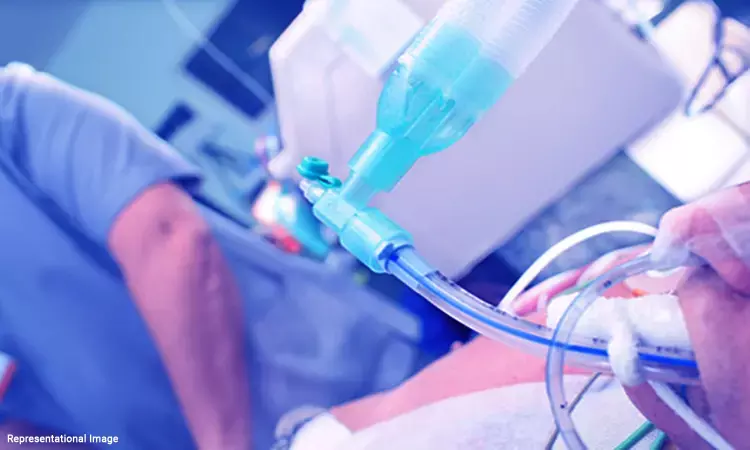- Home
- Medical news & Guidelines
- Anesthesiology
- Cardiology and CTVS
- Critical Care
- Dentistry
- Dermatology
- Diabetes and Endocrinology
- ENT
- Gastroenterology
- Medicine
- Nephrology
- Neurology
- Obstretics-Gynaecology
- Oncology
- Ophthalmology
- Orthopaedics
- Pediatrics-Neonatology
- Psychiatry
- Pulmonology
- Radiology
- Surgery
- Urology
- Laboratory Medicine
- Diet
- Nursing
- Paramedical
- Physiotherapy
- Health news
- Fact Check
- Bone Health Fact Check
- Brain Health Fact Check
- Cancer Related Fact Check
- Child Care Fact Check
- Dental and oral health fact check
- Diabetes and metabolic health fact check
- Diet and Nutrition Fact Check
- Eye and ENT Care Fact Check
- Fitness fact check
- Gut health fact check
- Heart health fact check
- Kidney health fact check
- Medical education fact check
- Men's health fact check
- Respiratory fact check
- Skin and hair care fact check
- Vaccine and Immunization fact check
- Women's health fact check
- AYUSH
- State News
- Andaman and Nicobar Islands
- Andhra Pradesh
- Arunachal Pradesh
- Assam
- Bihar
- Chandigarh
- Chattisgarh
- Dadra and Nagar Haveli
- Daman and Diu
- Delhi
- Goa
- Gujarat
- Haryana
- Himachal Pradesh
- Jammu & Kashmir
- Jharkhand
- Karnataka
- Kerala
- Ladakh
- Lakshadweep
- Madhya Pradesh
- Maharashtra
- Manipur
- Meghalaya
- Mizoram
- Nagaland
- Odisha
- Puducherry
- Punjab
- Rajasthan
- Sikkim
- Tamil Nadu
- Telangana
- Tripura
- Uttar Pradesh
- Uttrakhand
- West Bengal
- Medical Education
- Industry
Diaphragm Pacing tied to faster Weaning from Mechanical Ventilation in Cardiac Surgery

Surgeons at University Hospitals Cleveland Medical Center have improved the prognosis of several cardiac patients after emergency FDA approval of a diaphragm pacing device. An abstract detailing these findings will be presented at the 17th Annual Society of Thoracic Surgeons Annual Perioperative and Critical Care Conference.
In April, Synapse Biomedical, a spin out company from University Hospitals (UH) Cleveland Medical Center and Case Western Reserve University (CWRU), received FDA approval for emergency use of its TransAeris® Diaphragmatic Pacing Stimulator System to help wean patients, including those with COVID-19, off of mechanical ventilation (MV). Diaphragm pacing has the potential to free up ventilators because patients can be moved off of ventilators more quickly and easily with the help of this diaphragm pacing system.
The TransAeris® Diaphragmatic Pacing (DP) functions with temporary small electrodes implanted either at the time of surgery, or by an additional minimally invasive procedure, to stimulate the diaphragm (the breathing muscle). DP was initially developed for patients with spinal cord injuries, but has proven effective in helping patients to be weaned off the ventilator while they are recovering from cardiac surgery in the intensive care unit. UH was the first site in the United States to use this innovative procedure for cardiac surgery patients.
"The ability to decrease the need for mechanical ventilation frees up more ventilator units," said Raymond Onders, MD, Chief of General and Gastrointestinal Surgery and the Remen Chair in Surgical Innovation at UH and Professor of Surgery at CWRU. "Not only is this technology more efficient in weaning from the ventilator but it also decreases the complications from the ventilator. During the COVID-19 pandemic, we know it is important for all patients to reduce the amount of time they are on ventilators and this technology can potentially help."
The team identified patients for implantation with DP who had unilateral diaphragm dysfunction and were to be placed on a ventilator. These patients all underwent extensive cardiac surgery, and ranged in age from 24 to 72 years old. The patients were extubated in 6.7 hours on average, which is a short period of time given their operation and other medical conditions. No patients were re-intubated or developed any respiratory complications. All patients were discharged within nine days of surgery.
These findings are critical because prolonged ventilation and intubation after cardiac surgery is a complication which can lead to other problems. In this small series, Diaphragm Pacing positively affected diaphragm function and ventilation. Continued experience with DP can help enhance the recovery and weaning from a ventilator after cardiac surgery.
"Diaphragm pacing has allowed us to get some very sick patients off of the ventilator in surprisingly easy fashion. This has the potential to be tremendously helpful for many patients," said Marc Pelletier, MD, Chief of Cardiothoracic Surgery at UH Cleveland Medical Center.
These findings are even more important during this pandemic, since the TransAeris® system could reduce ventilator burden in COVID-19 patients by a significant amount. This could lead to more ventilators being available in a time of great demand, creating a better environment for other patients in need.
Source : 17th Annual Society of Thoracic Surgeons Annual Perioperative and Critical Care Conference
Hina Zahid Joined Medical Dialogue in 2017 with a passion to work as a Reporter. She coordinates with various national and international journals and association and covers all the stories related to Medical guidelines, Medical Journals, rare medical surgeries as well as all the updates in the medical field. Email: editorial@medicaldialogues.in. Contact no. 011-43720751
Dr Kamal Kant Kohli-MBBS, DTCD- a chest specialist with more than 30 years of practice and a flair for writing clinical articles, Dr Kamal Kant Kohli joined Medical Dialogues as a Chief Editor of Medical News. Besides writing articles, as an editor, he proofreads and verifies all the medical content published on Medical Dialogues including those coming from journals, studies,medical conferences,guidelines etc. Email: drkohli@medicaldialogues.in. Contact no. 011-43720751


